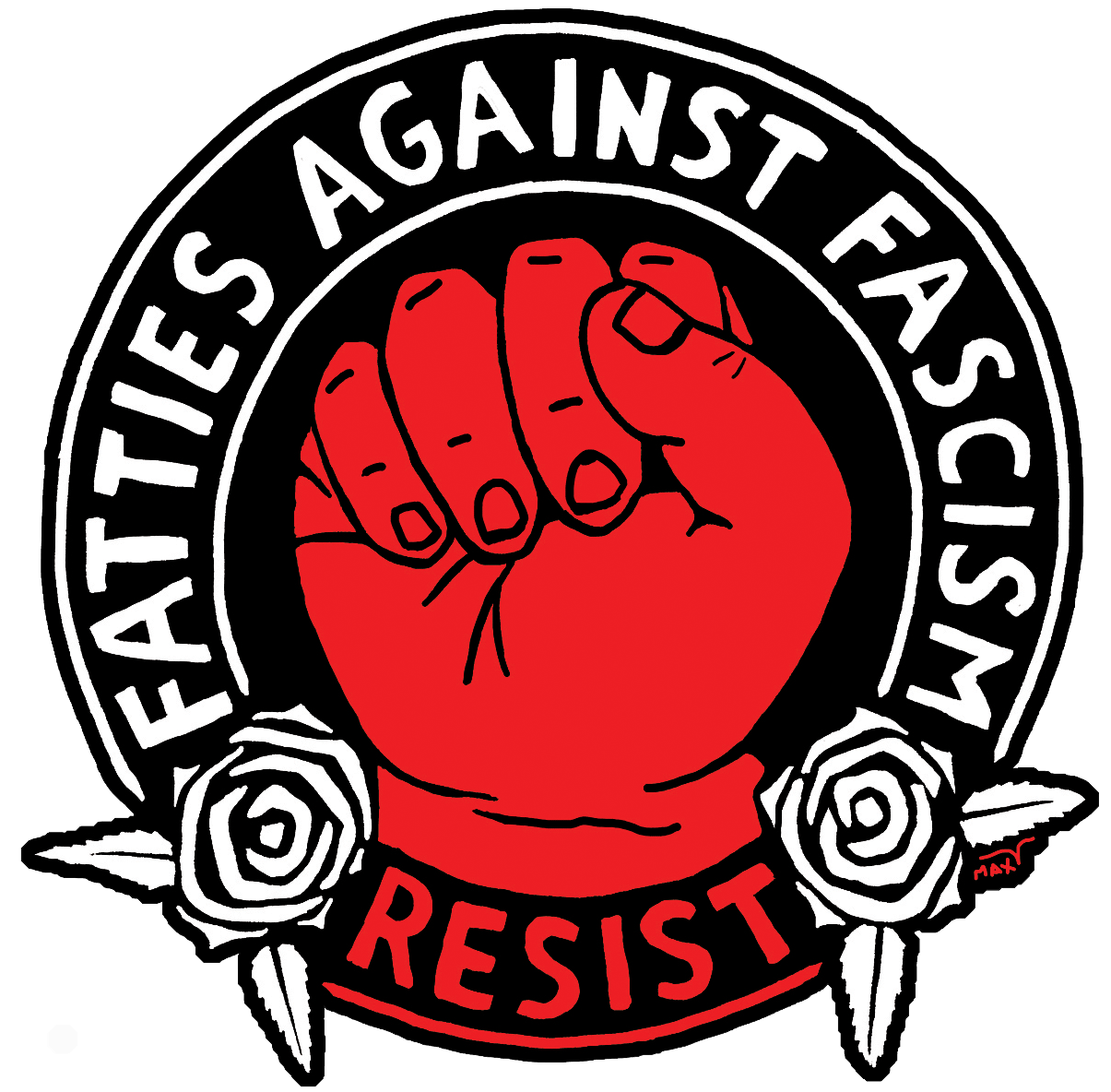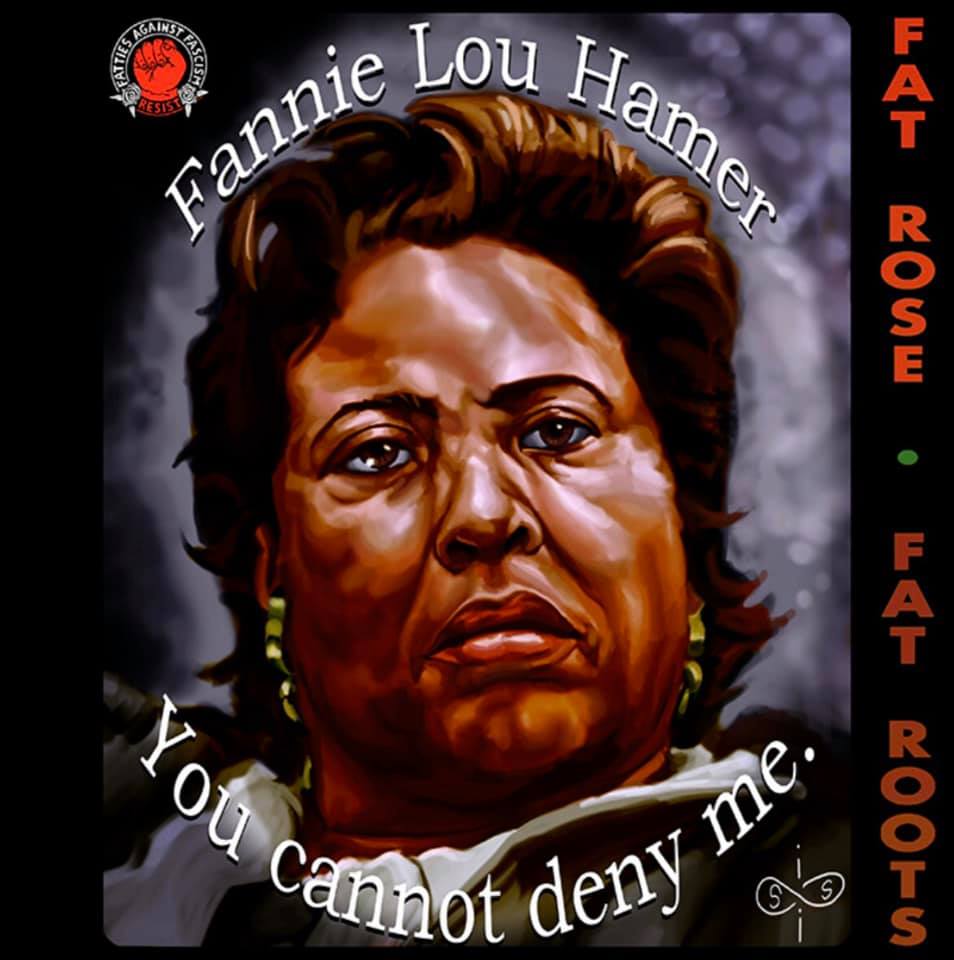As we continue to highlight our #FatElders and ancestors in the movement for liberation, today we honor Fannie Lou Hamer.
Painting by Isicera Dew, text by Heather Mack, Charis Stiles, and Isicera Dew for Fat Rose.
Fannie Lou Hamer was a Fat, Black, Disabled, Self-Educated, Femme cis-woman born into sharecropping, a legal modification of slavery, in Montgomery County, Mississippi in 1917. She came to represent the Mississippi Freedom Struggle of the Civil Rights Movement.
Fannie Lou contracted polio as a child and this resulted in chronic leg pain for the rest of her life. In 1961, Fannie Lou was sterilized without her knowledge or consent while having a tumor removed. This was a common practice in the Jim Crow South; her landlord conspired with her doctor in the common practice of non-consensually sterilizing Black women, nicknamed “The Mississippi Appendectomy”. Fannie Lou did not learn of this until a year later.
“They kicked me off the plantation, they set me free. It’s the best thing that could have happened. Now I can work for my people.”
In 1962, she learned about her right to vote when the Student Nonviolent Coordinating Committee (SNCC) visited her plantation. Angry that her rights were kept a secret from her, she immediately boarded the SNCC bus headed to the voter registration office. The next day, she was evicted from her home by her racist landlord.
“I’m sick and tired of being sick and tired.”
Motivated by her experience of injustice, she became active in the movement for civil rights and advocated within the Democratic Party for social justice and anti-racist reforms.
As a field officer for SNCC in 1963, she traveled Mississippi teaching rural Black folks about their voting rights and accompanying them to register. SNCC was targeted with regular police intimidation and harassment. During one coordinated state patrol effort to prevent Black residents from exercising their rights, Fannie Lou was arrested, brutalized, and sexually assaulted in a cell.
She famously spoke at the 1964 Democratic National Convention (DNC), as the co-founder and vice-chair of the Mississippi Freedom Democratic Party. Known as a powerful and persuasive speaker, Fannie Lou’s scheduled speech scared the DNC leaders so much that President Johnson scheduled a simultaneous speech to limit the country’s access to her message.
When the Democratic National Party continued to back racist candidates in the southeast, Fannie Lou decided to run herself for US Senate, as the first Black woman to ever seek national office.
She watched the changing trends of the civil rights era and adapted her own organizing strategies in response to lessons she learned.
Fannie Lou shifted her focus to economic redistribution and liberation of Black communities from sharecropping. She founded the Freedom Farm Cooperative in 1969 to organize Black Mississippians around cooperative land-ownership, housing security, and food access.
In 1971, she founded the National Women’s Political Caucus and experienced two “nervous breakdowns” over the next three years. She lived with multiple illnesses and passed away in 1977.
“Nobody’s free until everybody’s free.”
While we don’t know what Fannie Lou thought about fat liberation, we know that she worked towards collective liberation. She was vocal about intersectional feminism, although not calling it by that name. She was vocal about the ways white women organizers silenced Black women and preserved oppression of Black people.
Fat folks avidly contribute to our own liberation and the liberation of all. Always have, always will.
Fannie Lou is a cherished member of our Fat Rose lineage for her many gifts. She highlights that fat people have a long history as agents of change.
When oppressed groups are fighting for their rights, they often hand-pick those who conform to dominant values (read: young, educated, able-bodied, straight-sized) as representatives to be the public face of their movement. Fannie Lou teaches us that if fat folks wait for our invitation to take up space, we’ll wait forever. Fat leaders have existed in every fight for liberation, the difference is we almost always have to select ourselves to take on those roles; to take up that space.
Similarly, if we wait to be shown our fat role models, we will be told the lie that they don’t exist, and we will wait forever. We have to find them. And once we stumble on a few, we’ll come to see our history is filled with an unbroken chain of fat change agents who connect us to the intersectional fat activists who are making waves today.
Learn more about Fannie Lou Hamer and her life and legacy here:
Fannie Lou Hamer’s autobiography, To Praise Our Bridges
SNCC Digital Gateway page about Fannie Lou Hamer’s Leadership
[image description: a painted face portrait of Fannie Lou Hamer, a black woman with gold earrings. Her name appears above, and below the words “You Cannot Deny Me.” To the right are the words “Fat Rose, Fat Roots.”]

